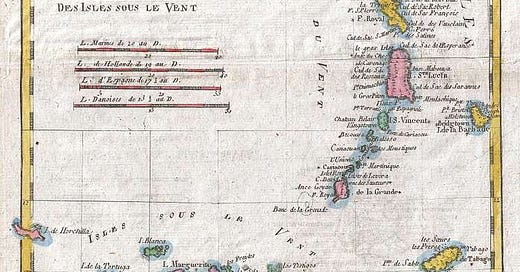Attorney General Michael Keane, the 'benevolent' slaver of St Vincent (September, 1788).
4 September 1788: to Miss Christian Shewcraft.
This letter is an extract from the letter book of Michael Keane. Keane, attorney general of St Vincent and the focus of last weeks post provided a fantastic insight into the life of a Irish colonial official in the Caribbean of the 18th century. In this letter we get a glimpse into the way in which slavery was dealt with, and how matter-of-factly so. This letter is reminiscent of others he wrote in which he spoke of stock and goods being transported for trade and profit. There is no language of humanising in his words but simply that of commodity - of pricing and haggling.
We are provided with two particularly insightful comments. As Quintanilla illustrated in his book, St Vincent was a frontier society perpetually short on labour, and in this regard slavery was used to alleviate this. However, Keane shows us that some sought to take the venture further by employing teams of male slaves, which could be hired out for fixed term leases to people with appropriate funds - Keane suggests he could lease a group for 5-7 years in this letter, but he would prefer to own them outright.
Another insightful moment is towards the end, when he almost brags of the treatment his slaves undergo. He portrays himself as a benevolent master of his slaves - ‘no negroes in St Vincent have lighter work or are better fed than mine’. Quintanilla points out that while this may be true, based on the morbid detail that the value of his slaves increased over time, illustrating better care than most who were worked into oblivion and ignored - we must consider the question of whether this was because he cared for them, or for his own financial interests?

Dear Madam,
This covers a set of bills of exchange for £50 sterling, equal to £85 currency drawn by our friend Mr [Richard James] Whytell, on Mr Bolton in Liverpool, on account of the arrears of rent due from Miller for the rent of the Negroes. I cannot exactly tell whether it is the full amount of what is really due, or not, as you may tell by Mr Whytells letter. But I shall have the account made out and sent you. Mr Wilson was the security for [David] Miller, and issued an execution against Miller in order to have it returned and fix his bail. But Wilson paid a set if bills of exchange for £80 which I remitted Mr Wise by Mr Grand and on account of some dealings between Wilson and Mr Whytell the letter has drawn the present bill, as I as very peremptory and insisted to have the money to be remitted you and your brother by Mr Hartley. I hope you will not lose by the exchange at 70%.
Mr Wise in his letter to me mentioned that the Negroes you carried wished to return and live with Mr Whytell. But Mr Whytell and Mr Edward French are concerned in a Task Gang and do not wish either to hire or buy women. I have written to Mr Wise that I would either buy them or hire them. Mr Whytell cannot recollect what it was he offered you as hire for them, but thinks it was 4 Joes. I would rather buy than hire and I would giver such a price as any two men that were competent judges to be named by Mr Wise and myself should value them at or I would hire them at £12 or £12.10 per head and give security as for the due and punctual payment of the rent, as for making good the appraised value of the negroes, upon a reappraismement at the expiration of the lease, which should be for five to seven years, should you or Mr Wise, choose to rent or sell them to me.
You know I live near town and market. No Negroes in St Vincent have lighter work, or are better fed than mine. I have at this moment plantain at my upper plantation sufficient to feed 150 negroes. I have name Mr J. Taylor, Mr Montgomery, or Mr John Crosbie or either of them as an appraiser on my part, should Mr Wise or you accede to my proposal.
I am with great respect and compliments to all the family.
Dear Madam,
yours
Michael Keane
Source: Mark S. Quintanilla, An Irishman’s Life on the Caribbean Island of St Vincent, 1787-90: The Letter Book of Attorney General Michael Keane (2019), pp 91-92.



